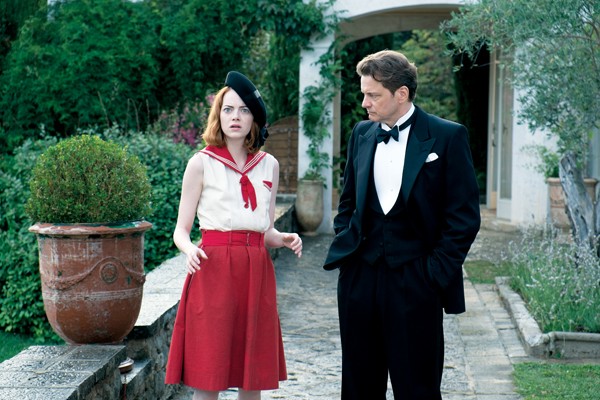Critical judgments are seldom permanent; when given some time and room to breathe, an underwhelming or puzzling movie from March can end up on a best-of list in December. This is also true for filmmakers. As the years go by, some filmmakers step into the spotlight while others slowly recede from view.
Then there’s Woody Allen, who doesn’t appear to care about things like legacy and influence. Allen plugs away year after year and movie after movie, confronting the same old issues and repeating himself in the same old comic or dramatic ways no matter how badly you want him to just stop already.
Amazingly, he can’t be entirely ignored yet. 2011’s Midnight In Paris, with its uncharacteristically loose Owen Wilson performance, its gentle insistence that there were never any good old days, its jokey depiction of Lost Generation icons, and its plentiful shots of Rachel McAdams’ ass (purely accidental, I’m sure), was his best and most playful film in nearly two decades. But Magic in The Moonlight, Allen’s latest European period piece, is a humorless reversion to a depressing norm.

Emma Stone and Colin Firth
The old-timey jazz tunes on the soundtrack, along with that unmistakably faux-classical opening title-card sequence promise more of the same old thing. Set at the end of the roaring 1920s, Magic stars Colin Firth as Stanley, a famous magician and skeptic who’s asked by an old friend to travel from Berlin to the south of France to debunk Sophie (Emma Stone), a young medium from Kalamazoo who appears to have real supernatural powers.
As everyone in the movie points out repeatedly, Stanley is the right man for the job: having sworn fealty to logic, reason, order, and nothingness, he spouts Nietzsche at people who look at him too long and smirks at anyone “desperate for a little hope in a world that has none.” But will Sophie show him the error of his ways? Well, would an Allen surrogate like Stanley dare to let some girl expand his conception of how the world works?
In this cotton-mouthed farce, Firth deserves some credit for making Stanley an insufferable prick. Strident, heedless, and almost angrily self-satisfied, Firth plows through the film like a cross between The Great Gatsby‘s Tom Buchanan and The Big Bang Theory‘s Sheldon Cooper. Emma Stone, playing the requisite ingénue, handles her diaphanous-dipsy role better than previous Allen muses. With help from cinematographer Darius Khondji’s blurry, lens-flared Mediterranean postcard work, Firth and Stone’s scenes together almost drown out Allen’s usual God-is-dead, what-does-it-all-mean bellyaching.
If you have to see a Woody Allen movie this year, John Turturro’s Fading Gigolo, in which Allen played a supporting role, is a gentler and sexier romantic comedy where the characters may have read some existentialist philosophy but have the good taste not to lecture each other about it. But never fear; Allen is already at work on his next project. Emma Stone will star.